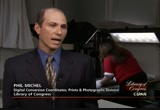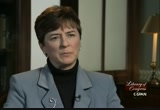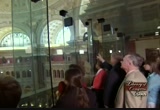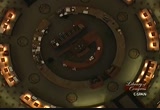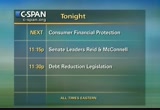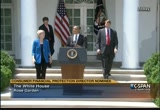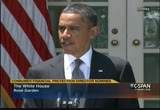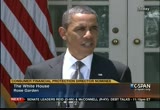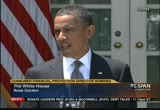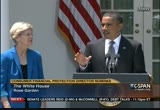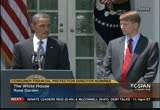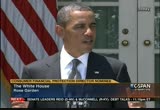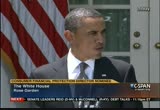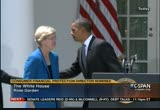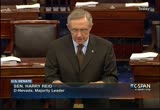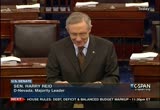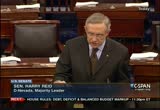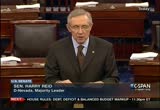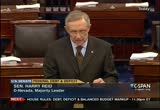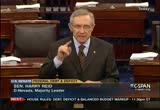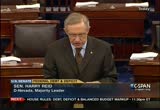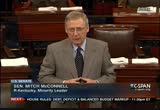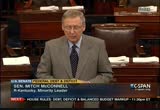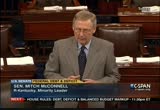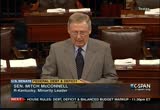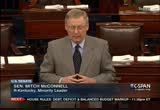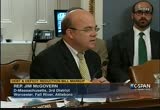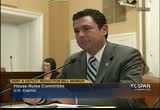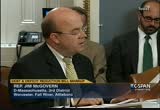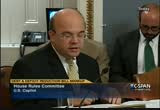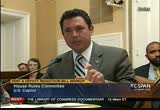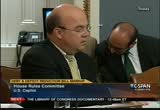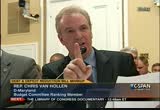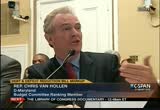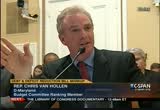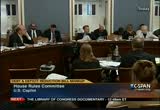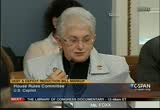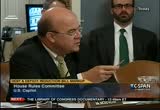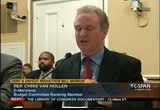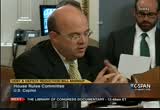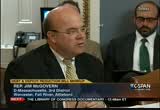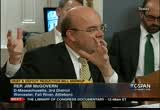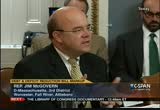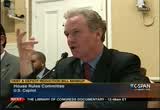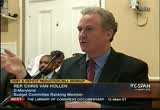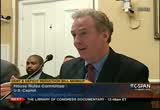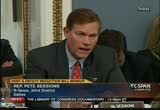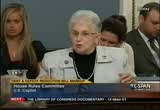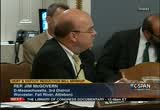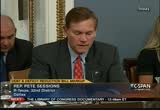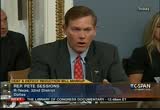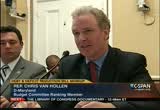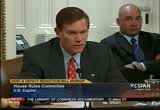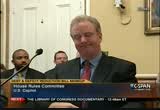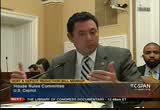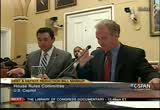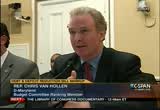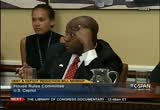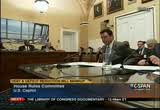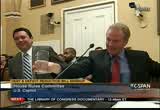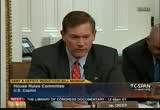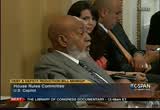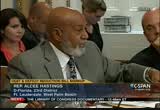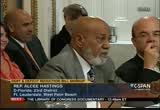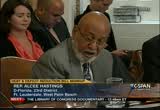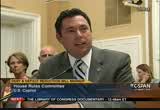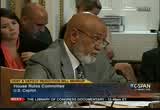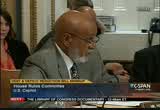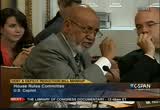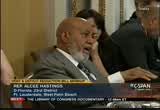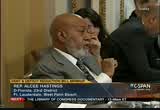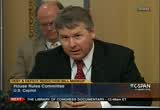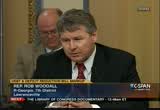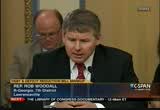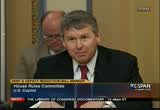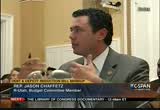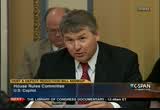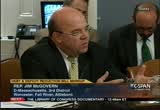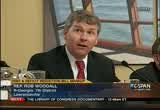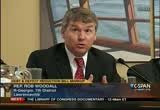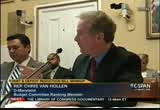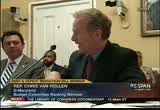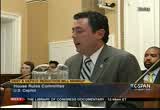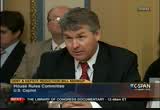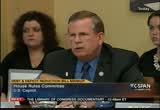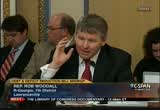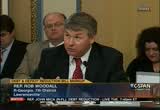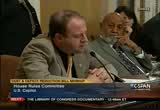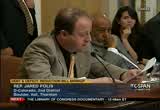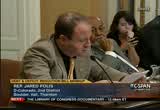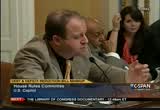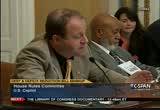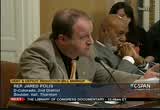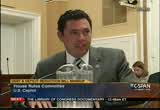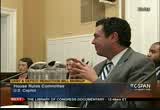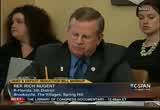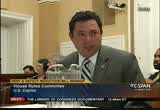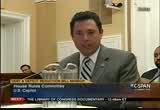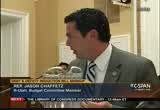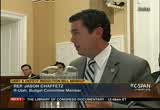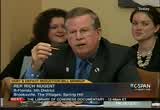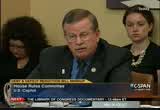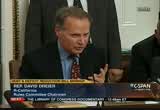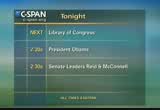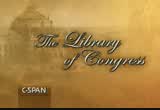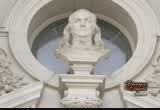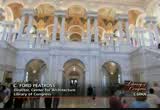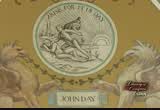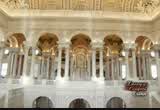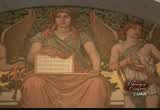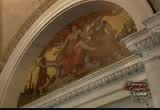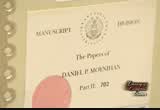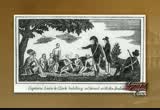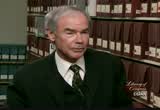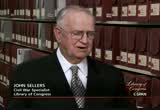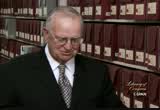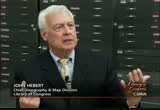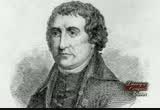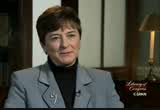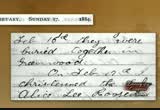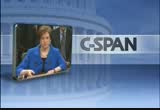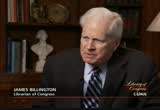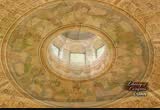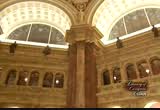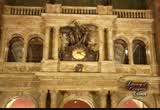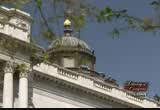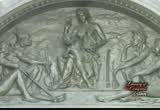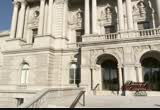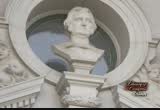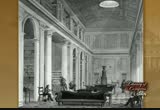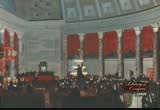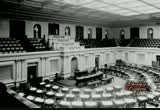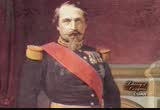tv Capital News Today CSPAN July 18, 2011 11:00pm-2:00am EDT
11:00 pm
the online catalog still includes descriptions about all the collections we have in the photographs division. you may find a lot of from descriptions a set of photographs that would exist here and you may not be able to see them on line. >> to see the originals, you half that travel to the washington and not all the collections are open to the public. gets to the man is track -- manuscript collection come with strings attached. >> there is a long history of people destroying things. >> we never want to put ourselves into the position of who or who should not see a collection. we are a public institution. we hope to have these materials as a sizable as possible. but the only way you're going to
11:01 pm
be able to ensure the preservation of these materials is if you do agree sometimes to a temporary restriction. >> can you give me a sample of some of the collection? >> alexander haig's papers, those are restricted until five years after his death. we have the henry kissinger papers here and they have the same restriction. >> there would be ones where common sense would tell you that there are restrictions. but there are usually parts that are not . >> research libraries are often stereotyped as balts. -- vaults. we keep the books but you're not
11:02 pm
supposed to touch them. the same with the photographs. as soon as you know you are librarian, the opposite is true. the whole purpose for keeping in preserving is to get the information back out to people, to increase research and exploration of the past. probably the best example is the fact that the library decided to archive twitter. we relapse that a little bit for doing so, but that is a long bit of history. and 100 years, this very ephemeral method of expressing our opinions, if we can have that for people look back and understand what people cared about and thought about, i think that would be very helpful for the future. it is not just about us pulling stuff in and holding it close. it needs to be used by people. it is a working collection. and is is not just doesn't giving it back, it is their riches that people bring as they
11:03 pm
ask us their questions. someone will come and study are photographs and write a book. many more people will be impacted. new ideas. >> are the world's largest library but we are also the home to the extraordinary objects that have come to us for the great generosity of collectors and through donors and the government, and have accumulated from presidents and authors. they are all here and our role is to make sense of them and make them available. so their story stay alive, so that people learn to work with them to gain new and different insights from them. the american people are very fortunate that they have this is part of their heritage. and it is made available to anyone who comes into the reading room. you get our readers cardin said at the table and you can experience it. it is access to information that
11:04 pm
is for democracy. that is what jefferson won his collection to be initially and what we still do at the library of congress. >> our feature documentary, behind-the-scenes of the world's largest library, rea errors tonight at 12:45 pm eastern. for more information on the library of congress, including a brief history, a quiz, and link to other resources, go to c- span.org/libraryofcongress. you can watch any of our documentary's online. code to -- c-span.org. it your own copy of the library of congress is only $14.95 for
11:05 pm
the dvd and 2995 for the blu- ray. c-span.org/store. >> the documentary reairs this sunday at 9:00 p.m. eastern. >> "the supreme court" is now available as rigid as an enhanced e-book. 11 original c-span interviews with current and retired justices. this new edition includes an interview with the new supreme court justice, elena kagan carried with the enhanced e- book, at your spirits by watching multimedia clips from all the justices. if "the supreme court" available now wherever e-books are sold. >> the house rules committee works on a republican proposal to reduce the federal deficit and national debt coming up later on c-span. on the senate floor today,
11:06 pm
senate leaders harry reid and mitch mcconnell talk about the ongoing debt ceiling negotiations. earlier, britain and obama nominated richard carter dougherty to head the bureau launching this week. he served as ohio's attorney general in the past. the nominee has to be approved by the senate. from the rose garden at the white house, this is just under 10 minutes. pff>> good afternoon, everybody.
11:07 pm
it has been almost three years since the financial crisis pulled the economy into a deep recession. and millions of families are still hurting because of it. they're trying to get by on one income instead of two, on fewer shifts at the plant or at the hospital. they're cutting expenses, giving up on a family night out so there's money for groceries. and for a lot of families, things were tough even before the recession. so we've got to get the economy growing faster and make sure that small businesses can hire again, so that an entrepreneur out there can sell a new product, so that the middle class is getting stronger again, and so folks feel confident in their futures and their children's futures. that's why we can't let politics stand in the way of doing the right thing in washington. we can't stand in the way when it comes to doing the right thing on deficits. and that's why i want to take
11:08 pm
steps like making sure payroll taxes for middle-class families don't go back up next year. that's why it's so important that we tackle the problems that led us into this recession in the first place. one of the biggest problems was that the tables were tilted against ordinary people in the financial system. when you get a home loan, it came with pages of fine print. when you got a credit card, it was as if the contract was written in another language. these kinds of things opened the door to unscrupulous practices -- loans with hidden fees and terms that meant your rate could double overnight. it led to people getting mortgages they couldn't afford, and it put honest businesses at a disadvantage. and it encouraged dangerously risky behavior on wall street, which dragged the economy into the mess that we're still trying to clean up. that's why we passed financial reform a year ago. it was a common-sense law that
11:09 pm
did three things. first, it made taxpayer-funded bailouts illegal, so taxpayers don't have to foot the bill if a big bank goes under. second, it said to wall street firms, you can't take the same kind of reckless risks that led to the crisis. and third, it put in place the stronger -- the strongest consumer protections in history. now, to make sure that these protections worked - so ordinary people were dealt with fairly, so they could make informed decisions about their finances - we didn't just change the law. we changed the way the government did business. for years, the job of protecting consumers was divided up in a lot of different agencies. so if you had a problem with a mortgage lender, you called one place. if you had a problem with a credit card company, you called somebody else. it meant there were a lot of
11:10 pm
people who were responsible, but that meant nobody was responsible. and we changed that. we cut the bureaucracy and put one consumer watchdog in charge, with just one job -- looking out for regular people in the financial system. now, this is an idea that i got from elizabeth warren, who i first met years ago. back then -- this is long before the financial crisis -- elizabeth was sounding the alarm on predatory lending and the financial pressures on middle-class families. and in the years since, she's become perhaps the leading voice in our country on behalf of consumers. and let's face it, she's done it while facing some very tough opposition and drawing a fair amount of heat. fortunately, she's very tough. and that's why i asked elizabeth warren to set up this new bureau. over the past year she has done an extraordinary job. already, the agency is starting to do a whole bunch of things that are going to be important for consumers -- making sure loan contracts and credit card terms are simpler and written in plain english.
11:11 pm
already, thanks to the leadership of the bureau, we're seeing men and women in uniform who are getting more protections against fraud and deception when it comes to financial practices. and as part of her charge, i asked elizabeth to find the best possible choice for director of the bureau. and that's who we found in richard cordray. richard was one of the first people that elizabeth recruited, and he's helped stand up the bureau's enforcement division over the past six months. i should also point out that he took this job - which meant being away from his wife and 12-year-old twins back in ohio - because he believed so deeply in the mission of the bureau. prior to this, as ohio's attorney general, rich helped recover billions of dollars in things like pension funds on behalf of retirees, and stepped up the state's efforts against unscrupulous lending practices.
11:12 pm
he's also served as ohio's treasurer and has successfully worked with people across the ideological spectrum - democrats and republicans, banks and consumer advocates. now, last but not least, back in the 1980's, richard was also a five-time jeopardy champion. and a semi-finalist in the tournament of champions. not too shabby. that's why all his confirmation -- all his answers at his confirmation hearings will be in the form of a question. that's a joke. [laughter] so i am proud to nominate richard cordray to this post. and we've been recently reminded why this job is going to be so important. there is an army of lobbyists and lawyers right now working to water down the protections and the reforms that we passed. they've already spent tens of millions of dollars this year to try to weaken the laws that are designed to protect consumers.
11:13 pm
and they've got allies in congress who are trying to undo the progress that we've made. we're not going to let that happen. the fact is the financial crisis and the recession were not the result of normal economic cycles or just a run of bad luck. they were abuses and there was a lack of smart regulations. so we're not just going to shrug our shoulders and hope it doesn't happen again. we're not going to go back to the status quo where consumers couldn't count on getting protections that they deserved. we're not going to go back to a time when our whole economy was vulnerable to a massive financial crisis. that's why reform matters. that's why this bureau matters. i will fight any efforts to repeal or undermine the important changes that we passed. and we are going to stand up this bureau and make sure it is doing the right thing for middle-class families all across the country. middle-class families and seniors don't have teams of lawyers from blue-chip law firms. they can't afford to hire a lobbyist to look out for their interests.
11:14 pm
but they deserve to be treated honestly. they deserve a basic measure of protection against abuse. they shouldn't have to be a corporate lawyer in order to be able to read something they're signing to take out a mortgage or to get a credit card. they ought to be free to make informed decisions, to buy a home or open a credit card or take out a student loan, and they should have confidence that they're not being swindled. and that's what this consumer bureau will achieve. i look forward to working with richard cordray as this bureau stands up on behalf of consumers all across the country. i want to thank both elizabeth and tim geithner for the extraordinary work that they've done over at treasury to make sure that, a year after we passed this law, it is already having an impact and it's going to have impact for years to come. thank you very much and congratulations, rich. >> mr. president, any progress
11:15 pm
in your talks with speaker boehner yesterday? any progress? >> we're making progress. [captioning performed by national captioning institute] [captions copyright national cable satellite corp. 2011] >> next, remarks from harry reid and mitch mcconnell on the negotiations. we will also get reaction on the nomination of richard cordray. democrats sat down with secretary tim geithner and the picture he painted is as follo follows. that is a picture of what our world would look like if the republicans in congress force this nation for the first time in its history to default on its financial obligations.
11:16 pm
the picture was really grim. this is how he described the state of our government. the state of our government if congress allows this unprecedented default. his quote -- "light's out." he said default would result i a complete -- quote -- "loss of capacity to function as a government." even tse who believe government should be small enough to drown in a bathtub have to admit of a total shutdown even the most basic and essential nction of government is very, very scary wouldn't be good for the american people and it certainly wouldn't be good for our economy. the senate has no more important task than making sure the united states continues to pay our bills and preexisting obligations like social security. now, i've sken to the president's office today. i actually had a phone call scheduled with him and we've scheduled for later but i've talked to his people and he
11:17 pm
understands the importance of our meeting our responsibilities that we have. and because of that, we're going to stay in session every day, including saturdays and sundays, until congress passes legislation that prevents the united states fm defaulting on our obligations. i've spoken to the republican leader. he understands the necessity of our being in. we have a lot of things to do. not as many things as normal but extremel important things that are going to take time. so i know it may be inconvenien to have people rearrange their schedules. this means saturdays and sundays and mondays. we have to be in -- in session continuously. secretary geithner described how 80 million checks cut by the treasury every day -- that is, 80 million checks every day -- would likely simply stop coming. the federal government would, in effect, go dark. paychecks for troops in
11:18 pm
afghanistan and iraq and based around the world could stop. f.a.a. towers could shut down. could the f.b.i. and the c.i.a., border crossings could close, safety inspections of food americans eat and cargo that enters our ports could halt. literally every function of government could cease. social security checks, payments to our veterans. we've heard that before. there would be no discussion of which operations and personnel were essential. all the payments would very likely stop. some have said we could prioritize which bills to pay. even if that wouldn't irreparably damage our nation's reputation and credit in the global economy and the globe at community, which it would, is also a complete fiction. our government won't even be able to cover the bills due on august 3. it will simply run out of money and because we'll ben default and our credit rating trashed, we'll be able to borrow the money not again to keep running, even if we wanted to.
11:19 pm
that's a picture secretary geithner painted. like i said, it's grim. many of my republican colleagues understand this fact. they know what's at stake. it's not blanket, for sure. but the irresponsible republicans say default would not be an unmitigated disaster for this country either don't know what they're talking about or are twisting the truth for political gain. americans have gotten the message. 71% of the american people disapprove of the way republicans have used this crisis to force an ideological agenda. that's in the press today. even a majority of republicans disapprove of their unreasonable refusal to compromise, which puts our entire nation at risk. those who say this crisis would be a blip on the radar are wrong. default would be a plague that could haunt and would haunt our nation for years to come. our credit rating would take years to rebuild. the country would never, ever be the same. some will say this is an
11:20 pm
exaggeration. but it's not. this is what treasury secretary gehner told us. that's what business leaders, congress and rating agencies and bankers have all told us. this country defaults on its obligations, they say, secretary geithner for cerin says -- and i quote -- "it will be much worse than the great depressio depression." it would make the massive financial crisis of 2008 look mild. it will make what we just went through look like a quaint little crisis, secretary geithner said. i repeat, it will make what we just went through look like a quaint little crisis. that quaint little crisis led to the loss of almost 5 million american johns -- american jobs, it caused our banking system to nearly collapse, more than $34 trillion -- mr. president, that's not million, it's not billion, it's trillion -- more than $34 trillion in worth
11:21 pm
was destroyed in less than two years and the ripples were felt throughout this nation and around the world. the average american family lost $100,000 on its home and stock portfolio alone and 400,000 families were plunged into poverty. that crisis was minor, again, geithner said, compared to the potential fallout from the u.s. default. no one should suggest from what i said secretary geithner thinks what has taken place the wall street collapse is minor. but it's minor compared to what he believes would happen if we defaulted on our debt. the leading business and economic voices of our time said it again and again, the risk of default are unthinkable. it would be a catastrophe. secretary geithner also said we're rning out of time to avoid this iceberg, this huge iceberg, mr. president, is in the ocean and our ship of ste is headed toward it. the ting agencies have already placed our triple-a credit
11:22 pm
rating under review and could downgrade it at any time. this is what secretary geithner said. again, i quote -- "the eyes of the country are on us, the eyes of the world are on us and we need to make sure we stand together and send a beginsive de signal that we're going to take the necessary steps to avoid default." so, mr. president, i ask what it will take my republican colleagues to wake up to the fact that they're playing a game of political chick wen the entire global economy -- chicken with the entire global enomy. they must wake up soon, mr. president. mr. mcconnell: mr. president? the presiding officer: the republican leader is recognized. mr. mcconnell: let me echo the initial remarks of the majority leader with regard to the decision which in this particular instance would agree was a mutual decision that we need to stay in every day until we resolve this crisis confronting our country. and so i concur with what the majority leader said. we'll stay many here every day,
11:23 pm
monday through sunday, and get this problem fixed for our -- for our country. mr. reid reid: reid: mr. presidi could -- [inaudible] i would hope the republican leader noted that following the content of my -- the tone and content of my statement where i didn't lump all republicans in one big bundle there. pardon thenterruption. mr. mcconnell: i thank my friend, the majority leader. this is a pivotal week for america. two years of reckless spending and debt have brought us to the point of crisis, and this week americans will see how their elected representatives decide to resolve it. on the one side are those who believe that failing to rein in spending now would be calamitous and that a government which borrows 42 cents for every dollar it spends needs to sober up. washington needs strong medicine to heal its spending addiction
11:24 pm
now, not a false promise to do it later. and on the other side are those who want to pretend the status quo is acceptable, that everything will be fine if we freeze current spending habits in place, raise job-killing taxes on small businesses, and do nothing abouthe long-te fiscal imbalance that imperils our economy. now, republicans have tried to persuade the president of the need for a course correction but weeks of negotiations have shown that his commitment to big government is simply too great to lead to the kind of long-term reforms we need to put us on a patho balance and economic growth. so we've decided to bring our case to the amecan people, and that's why this week republicans in the house and in the senate will push for legislation that would cut governmentpending now, cap it in the future, and which only raises the debt limit if it's accomplished -- if it's
11:25 pm
accompanied by a constitutional amendment to balance the federal budget. the cut, cap and balance plan is the kind of strong medicine washington needs and the american people want, and republicans in both houses of congress will be pushing it aggressively this week. i heard one of my democratic colleagues say yesterday that the votes simply don't exist to passny bill in the senate that balances the budget. question is, why in the world not? if you can't vote for a bill that says you will live within your means, then you've gen up and you agree that the unsustainable path is the only one we have. and thas really completely unacceptable. every single republican in the senate supports a baland budget amendment. all we need is for 20 democrats to jn us. and by my count, at least 23 of them have led their constituents to believe that they'd actually fight for it. so my message to senate democrats this week is this.
11:26 pm
i would suggest you think long and hard about whether you'll vote for cut, cap and balance legislation that the house is taking up tomorrow. not only is legislation just the kind of thing that washington needs right now, it may be the only option we have if you want to e the debt limit raised at all. the white house has called for a balanced approach in this debate. well, a bill that actually balances our books is coming to the senate floor this very week. i strongly urge my democratic friends to join us in supporting it. some have said they think this bill goes too far. with all due respect, i think most americans believe congress and the white house have gone too far in creating the fiscal mess we're in right now. it's time for real action. it's time to show the american people where we stand. it's time to balance our books. now, on another matter, mr. president, earlier today the president announced his nominee to run the consumer financial protection board -- bureau.
11:27 pm
i would remind him that senate republicans still aren't interested in improving anyone -- in approving anyone to the position until the president grays agrees to make this massive new government reaucracy more accountable and transparent to the american people. 44 republican senators signed a letter to the president stating -- quote -- "we will not support the consideration of any nominee regardless of party affiliation to be the cfpb director until the structure of the consumer financial protection bureau is reformed." and we've been very clear about what these reforms would need to look like. republicans have voiced our serious concerns over the creation of the cfpb because it represents a government-driven solution to a problem government helped create. we have no doubt that without proper oversight, the cfpb will only multiply the kind of countless, burdensome regulations that are holding our economy back right now and that
11:28 pm
it will have countless unintended consequences for individuals and small businesses that constrict credit, stifle growth, andestroy jobs. that's why everyone from florists to community bankers oppose its creation in the first place. that's why we'll insist on serious reforms to bring accountability to the agency before we consider any nominee to run it. it took the president a year to nominate someone to this position. i hope he won't wait that long to address our concerns and bring the cfpb the accountability and transparency it crently lacks. >> tomorrow, hearings from london on the phone hacking scandal. the british home affairs committee will look into allegations that the malik to hippolyta and police took payments from journalists. john yates who resigned this
11:29 pm
week will testify. news corp. chairman rupert murdoch and his son james will testify in the house of commons about the allegations on tuesday. there will be joined by rebekah brooks who resigned last week. on sunday, she was arrested and questioned about her knowledge of phone hacking and police bribery at news of the world. live coverage and 9:30 a.m. eastern. the house rules committee met to debate deficit-reduction legislation that the republicans are calling cut, cap, and balance. president obama has issued a veto threat for the measure. it requires congress to pass a balanced budget amendment to the constitution as a condition for raising the federal debt ceiling. the full house will pick up the legislation to more appeared to technical problems, we rejoin our coverage in process.
11:30 pm
>> i think it rose red meat to the extreme right wing of the republican party. over the last several weeks, the white house and congressional leaders from both parties have been in negotiations, trying to figure out a way to get by this impasse. here we are getting close to the day, and rather than trying to figure out how to come together, this is a sharp right turn. this drives us off the cliff. this is not an attempt at compromise. it may be attempt at a local coverage. in that case, i get it. but i have a hard time believing
11:31 pm
that this is a serious effort. bob greenstein says that this is one of the most ideologically pieces of legislation to come before the congress in years, if not decades. how would like unanimous consent to in his entire statement into the record. the white house has issued a veto threat. mr. chairman, let me ask are you here asking for an open rule? >> note. >> what kind of roller you asking for? i would like to insert a letter of the budget committee who calls for an open rule. you do not favor that. [inaudible] >> a request a pre-printing
11:32 pm
requirements. >> are you asking for an amendment to be made in order? [unintelligible] >> you are here representing one of the committees under jurisdiction. how many hearings were held on this bill? how many witnesses came to testify? >> this bill was just introduced last week. >> so there have been no hearings and no witnesses and no markup. this is been put together this last week. >> and we are dealing with a deadline of august 2nd. >> so the committee scheduled is thrown out the window. this is a born stuff we're talking about, the future of our economy. >> i wish we were not in such deep debt. i wish we did not have a looming crisis. >> did this just hit you this week? we have been talking about a
11:33 pm
four weeks if not months. >> my understanding, there has been broad bipartisan support for a balanced budget amendment in the past. >> we are all trying to balance the budget. we are trying to get this economy in the right direction. you make it sound like this is no big deal, that it just as a matter -- >> it is a very big bill. >> requires that federal spending as a percentage of gdp be as low as 19.7%, and enforces spending caps, and makes raising the debt ceiling contingent on congress passing a balanced budget amendment to the constitution. it is not about wanting to get our fiscal house in order or balance the budget. we all do. the issue is how you get there. this is a lot more detailed then i think you are presenting in your testimony.
11:34 pm
i am curious under the rules committee, we like to talk about openness and following the rules and regulations of the house, it seems odd to me that something of this magnitude would come to the house without a single hearing, without a mark that, without a single witness testifying. all like to know what this means to pell grants and to the national institutes for help or to our roads and bridges programs. do we say to our cities and towns, raise property taxes if you want to fix a bridge? there are implications of this. there is a human face behind this. what troubles me -- is the pentagon exempt? >> if you look at what we are asking -- >> i am asking is the pentagon exam?
11:35 pm
>> i ask that -- if you will at all -- if you will allow me answer. it was interest through the budget committee and was passed out of the house. we have roughly 12 hearings on that along the way. theou're saying that defense is not a part of this? >> what we're saying over 10 years is that future congresses will have to wrestle with where the cuts are, what gets funded and what does not. that is the beauty of what we have produced here. future're saying to the congresses, they will have to make the tough and difficult decisions. it does not contemplate for mandate one way or the other that's also security or medicare gets caught. it is disingenuous to suggest
11:36 pm
that this plan naturally cuts entitlement programs. >> as a cut everything across the board? >> of harry reid and steny or you're wearing goat. i assure you never voted for this kind of twisted version of a constitutional balanced budget amendment. this is an effort to manipulate the constitution, to stack the deck in certain ways. it has to devices to do that. one is to require a supermajority vote to raise revenue. the other device is putting on this 18% cap. those were not in any balanced budget amendment supported by steny hoyer and harry reid. that is what makes this provision is especially perverse. you can have a good debate on the issue of a garden variety balanced budget amendment. this is not that. again, what this does, and let us be very clear, it creates a
11:37 pm
supermajority requirement to close corporate tax loopholes for the purpose of deficit reduction. we keep hearing the statement that 49 states have balanced budget amendments. only 10 by our count right into their constitution a limitation of requires two-thirds or more of a vote to raise revenue. what that does is immediately tilt the playing field. the reason we say that this is a constitutional blueprint for the republican budget that ends the medicare guarantee, slashes medicaid, and for tax corporate loopholes, is because of those two features. let me just read you the testimony of the sponsor of the cheek balanced budget proposal. this twisted version of was reported out of the judiciary committee, he was asked by mr. nadler to identify one budget
11:38 pm
proposal that would meet the strictures of this requirement. now a budget that passed the house last year, the republican budget, did not meet it. that would require is to lift the debt ceiling by $8 trillion between now and 2021. but what almost mend it but not quite was the republican study committee budget. this is mr. goodluck @'s answer. i would direct you to the house republican study committee at which balances it in nine years. that is the republican budget on steroids. their republican will require rigid that budget will require deep cuts to medicare, s medicare, social security, and education. and when you couple that with this provision that says you need a two-thirds vote now by constitutional fiat but close corporate loopholes for the purpose of deficit reduction,
11:39 pm
you will guarantee those kinds of terrible decisions. >> with the gentleman from massachusetts yield? affetz answereck and that would be have a deal. >> medicare, and others show be exempted. that is the strict language of the bill. >> that is very false comfort. that says that if the congress does not get those particular targets, which is directed to dubai constitutional mandate now, then they can say they can exert -- exempts certain programs. it does not say that congress cannot and should not hit those programs for the purposes of it hitting the new structure written into the constitution. >> i appreciate jomon from
11:40 pm
massachusetts yielding. i will light up point out that mr. van hollen a studiously ource. going to the sto i like going to the source. h.r. 2560 shows that it is a 10- page bill. but page one is a listing of all the people who are co-sponsors. so it is basically an nine-page bill. also at the beginning of page two, it has the boilerplate language on it. and in the titles take up a lot of space. we are really talking about probably, maximum, and eight- page bill. and if you put it on eight and a half by 11 paper, it is probably a seven page bill. so it is very short.
11:41 pm
what i like to do is encourage the american people to read this. it is so short and it is written in very plain language, contrary to most bills. and the most important thing is on page four, exempt from direct spending limits, which is in direct contradiction to mr. van hollen's comment, which says the direct spending for the following functions is exempt from the limits specified in subsection c, social security, medicare, veterans' benefits. mr. van hollen continues to raise the specter of medicare being cut. >> mrs. fox, which let me to respond to that? >> it is amazing that such a short bill can do so much damage. and just because it is only nine pages, as you say, does not mean
11:42 pm
that we should not have hearings on it and there should not be witnesses and it should not go through a markup. this is a big deal. the idea that because it is a short bill, it is no big deal, which cannot follow regular process. that is not the weight -- the right way to go. >> thank you, mr. mcgovern. miss foxx, if you read the bill, that only applies the fiscal year 2012. it sets of budget targets for 10 years. the only way that cap applies is the first year. the remaining years continually ratcheted down. it is in the section related to the cut, ok? it goes cut, and then capped, rigging of thee id constitution, that is what it does.
11:43 pm
so if you look at the constitution, i would urge the american people not just to read this. but read it in connection to the constitutional provision that they are proposed, which jerry rigs the constitution of the united states in a way that favors by definition cussed the things like medicare over closing corporate loopholes. it requires two-thirds to eliminate the corporate tax loophole for the purpose of that is a reduction. you're going to put that into the constitution of the united states. >> by reading of the bill, so security and medicare are on the table for future cuts. it is a born that that be clear. if that is something that the gentle lady from north carolina disagrees with, maybe she could join us and call for an open rule and maybe we can make the necessary adjustments when the
11:44 pm
bill comes before the house. i was reading in the newspaper, i do not know how true it is, that the republican leadership were talking about raising kocher's on hold at -- copays on home health care. for whatever reason, they do not define that as a revenue. and yet trying to eliminate the corporate loophole for donald trump's jet somehow was something is an insurmountable thing for us to eliminate. bottom line here, the problem with the republican approach here is that it disproportionately impacts the most vulnerable in our country . if disproportionately impacts our senior citizens, people who had nothing to do with getting us into this mess to begin with. yet it exempts corporate welfare, that tax loopholes that i think by any standard are
11:45 pm
egregious. this bipartisan consensus outside the beltway that some of these corporate welfare should be gotten rid of. yet it becomes impossible to do that. it is impossible to do that in the budget negotiations with the white house and congressional leaders. paying for these wars. we are borrowing $10 billion a month for afghanistan. and yet we're saying we're going to balance the budget by going after poor people, senior citizens, by going after pell grants. if people talk about jobs. you have to invest to create jobs. you cut these programs and it is hard to be competitive in these economies. when you cut money for education and transportation infrastructure, it becomes more difficult to become competitive. we need to be smart about this. this approach of exempting
11:46 pm
corporate welfare, to me, is egregious. let me finally say this, and that is, i will and as i began here, i thought we would be coming back talking about how we're getting closer. and this built the best i can, i hope this is just bad political theater -- but this bill is a sharp right turn grid it moves us further away from where i thought we were getting too. i hope it does not delay our ability to come to some sort of an agreement between the congressional leadership and the white house. i hope this is not something that further fuels this notion that somehow it does not matter whether we get a deal by august 3 or not. this is serious. and to come before the rules committee, to bring a bill to the house, with no hearing, no witnesses, no markup, something put together over the weekend
11:47 pm
and we're coming back on monday to do this, when we already know the white house will not accepted, i think it is wrongheaded. i really wish we were not here. we need to get serious about getting this out. i yield back my time. >> i apologize for being late. i just arrived on a plane. >> welcome to the rules committee. >> chris, welcome. i think what has been going on for a long period of time is that there has been a debate and discussion between the white house, republican leaders, democratic leaders, leaders of the house and the senate with the white house, and has the president never put anything in writing about what he was like to see as his proposal? >> yes, as i said in response to a question from this box -- miss foxx.
11:48 pm
yes, he outlined in his speech a george washington university april 13 a proposal which we have gone into some of the components of already. >> is that a bill? >> also the company documents that went with it, $4 million in deficit reduction over 10 to 12 years. for example, it calls for about a trillion dollar reduction in discretionary spending including $400 billion in defense. it lays it out actually in quite a lot of detail. as you well know, the president also engaged in discussions at the white house with the speaker of the house where they fleshed out some additional ideas. the barrier beyond which they could not apparently go was the president's saying, i want a balanced approach of $3 in cuts
11:49 pm
to a dollar in revenue by closing corporate tax loopholes for deficit reduction. and the rates at the very top in 2013 would go back to where they were in the clinton administration. that balanced approach apparently was rejected. so here we are. >> the president has been talking about corporate jets. is that to be added to the proposal? >> there are lots of corporate loopholes and the tax code. there is no reason. >> is that a corporate loophole? >> i think that fact that corporate jets get seven years depreciation and private jets get five years depreciation, that is a loophole.
11:50 pm
you can have a loophole in the law and that is why we have to change it by changing the law. >> that is the law. >> no question that the subsidies that -- that the subsidies for the oil and gas companies are a matter of law. we ask you to join us in closing some these subsidies for the purpose of reducing the deficit. >> i will just tell you, i think that what we're playing here is a game where the president can speak for the president and he does, mr. boehner has to speak for a body that he controls literally not one vote, and i know that is a strange thing for people perhaps in every party to understand, but i would never vote for a tax increase. i think a huge number of my colleagues have been honest about saying that for a long time. it is interesting that the president is going to test bed knowing the resolve on the side.
11:51 pm
the best test that knowing the resolve on this side. knowing is a nonstarter, -- it is of nonstarter. >> i think you asked a very telling question of mr. van hollen about what he calls a loophole is actually the law. it is a tax law. to you know where that tax law was written in its most recent iteration? >> no, ma'am. >> it was actually in the stimulus bill which the president pushed in which every republican voted against. so i find it very interesting that the president has to pick something to gimmick -- to demagogue which was actually in a bill which he pushed and these democrats all voted for. but i thought since you're
11:52 pm
pointing out so eloquently that it was a lot that we might ought to explain where the law came from. >> reclaim my time. the gentleman from massachusetts. >> i appreciate the gentleman saying he would never vote for a tax increase. the debate is whether it is a bad law, all local for corporate jet, whether that constitutes a tax increase. but as the dominoes, have consistently raised the issue here that we are at war. and we're not paying for it. for me there is something wrong with the fact we ask our men and women to go and fight and die for what we voted for. i think we should and these wars, the less end -- end these wars, and how you deal with things like that if you do not say at some point that we're all going to have to pay for it?
11:53 pm
you cut medicare and social security and pay for it? that is a big part of our debt problem right now. >> reclaim my time, i will answer the gentleman's question. i have two sons, the 22-year-old is in the top 10 academically of the status in this country and wants to be a doctor. virtually every doctor that he knows is begging him not to become a doctor. so the a look from a 22-year- old who has studied hard his whole life but may want to be a doctor, every doctor in this country, how did they get it right that the health care bill passed is anti-competitive and a government takeover that will cost 800,000 jobs? how can i justified that? well, it is the law. on the other side, i've got it
11:54 pm
down syndrome son who is in the bottom 2% academically. he will need substantial help. alex is going to be competing against all of us in health care against people who have every ability to take care of themselves, should not look for government alliance or government programs, and he is going to be and what phil gramm called that wagon, all little red wagon of people who cannot take care of themselves by disability, perhaps physical or intellectual disabilities, he is going to be in there with senior citizens, should be, people who cannot take care of themselves because they are poor. instead, everybody is going to be loaded in there. the gentleman asked about how i can think about the war. there are many things that may not be fair, but there is the
11:55 pm
law. and we all try to work together and we should try to work together. there are a lot of things i do not like, either. one thing i do not like is people who demagogue or say things that are not true. we are not jerry rigging, chris, the constitution. this is a constitutional process. i have read the words. >> mr. sessions, would you like for me to tell you where they are? section two. my colleague reference people like harry reid and steny hoyer supporting a balanced budget amendment. this is not in the traditional balanced budget amendments that we have seen and debated in the past. what you have here is in section 2, page 5 and my copy, it says, outlays for any fiscal year shall not exceed 80% of economic output of the united states. when you write that cap into the
11:56 pm
constitution of the united states, you will require deep cuts to those programs. as i indicated earlier -- in l the last time the united states government hit that target was in approximately 1966. we now live the retirement of the baby boomers. the other provision that jerry rigs the process is section 5. it says a bill to increase revenues and not become law unless two-thirds of all number of each house shall provide by roll call vote. you cannot eliminate a tax subsidy to the oil and gas industry for the purpose of reducing that deficit under that provision of the constitution. you can call of what you want, but you are writing into debt -- oh, really? what you call that? >> i call that a standard constitutional decision to make sure that what happens is that we're going to agree to raise taxes on people hurts jobs and
11:57 pm
kills the economy, that we should make it tough to do. >> what i said it said it is favor of the approach taken by the republican budget. the approach is to cut medicare which could to buy a majority vote and protect these corporate tax loopholes. this now says you have as two thirds to get rid of one of them. [inaudible] >> we were talking about these corporate tax loopholes, mr. chair. again, you're talking about
11:58 pm
picking winners and losers to the tax code. when you have a subsidy that will make any economic difference whether it is on the expenditure or receipt side, i do not see that it does. if you want to subsidize something, there is a government priority do it. you do it to a tax subsidy for an expenditure subsidy beer they are economically the same. why can we discuss bringing them both back under the same breath. they are the same sort of thing. we're talking about stopping the government from picking winners and losers in the private sector. the government should not be saying if you do this one thing, you get the special tax treatment. [inaudible] >> the house that pass out of budget, that is what we called for in the budget. i will work and a bipartisan way
11:59 pm
to get rid of some of these loopholes if we brought down the rates. that should be neutral in terms of raising taxes. we do not want to see a net tax increase. and they'd gentleman was referring to specific points in a piece of legislation that is not in this bill. this bill contemplates a balanced budget amendment moving forward. that has various different options in it. perhaps one of the ones that made move toward is the one offered by mr. goodlatte, but it could be that one or a similar amendment as long as it met the basic parameters. to highlight the specifics of 80% in a balanced budget amendment has -- that is moved to the judiciary committee, it is not necessarily the bill that would be required to move through the house and the senate. >> you do require that two- thirds supermajority. >> not in that bill.
12:00 am
>> it would have to contain a provision that says you need a two-thirds vote to do anything to raise taxes. >> to raise taxes, yes, but not a spending cap at 80%. it does say that in the i do not doubt what you are reading here. >> would you specifically identify the house resolution? the required 2/3 on the peace? >> are you saying you are absolutely opposed to anything that would stop the congress from raising taxes? >> i believe this is a democratic institutions and people should have a majority vote subject to the checks and balances of congressional and executive relations. i do not think you should put
12:01 am
artificial constraints on majority votes and pick the circumstances to apply that to. >> we are destroying this country from this institution and body of taxes and big government. >> we looked it up and we can all research this. by our count, there will be about 10 states that right into their constitution a provision that says you need 2/3 or more votes. >> did you start with the 111th congress? >> in fact i did. >> was a house controlled by the republicans are the democrats? was the senate controlled by the republicans or the democrats?
12:02 am
and was the white house controlled by the democrats or republicans? >> one-party control. >> so the folks who are protecting the loopholes that are actually lost did not address any of the loopholes last year, when it was the democrats. but during that time they had the majority 100%. the past the health-care bill that created a $2.6 billion entitlement we cannot afford. did it not take away $500 billion from medicare? >> that was a plan which was brought before the rules committee and is a law -- the president is on record of saying there should be substantially more. you and i have been up here perhaps a long time.
12:03 am
mr. chambers is a relatively new member. he is part of a new breed of people. we are worried about this country and we no longer can continue to do what does not work. what does not work is taxing and spending big government. i think the american people will see this loud and clear and it will continue to be important to the people of this country. >> i am worried about the future course of this moment. >> i know you and i have had plenty of opportunities to work together to find common ground. we have never allowed it to become personal in any way. i appreciate that very much.
12:04 am
i yield my time. thank you. >> thank you very much, mr. care. when i listen to you, i believe there is the possibility there will be an agreement, because there are only two ways to go about this, and you said no revenues. you did not say revenues. you said no taxes can be considered. that sounds to me like an unwillingness to compromise. >> what it should sound like -- i appreciate the gentleman. i think he is engaged with me. there is a lot of money that is to be gained from the sale of property that the united states government has to go and spur our economy through the use of natural resources. there are a lot of ways to do it other than just taxing someone
12:05 am
else. i assure you if you go after the oil industry, the energy industry, what they will do is they will raise the prices for consumers and will continue to have food prices slide the way they are. >> let me reclaim my time. i have been playing left guard a long time. i do not recall them ever going down. the same goes for insurance. i do not have a single year went insurance rates went down. i need to make a couple of things clear here. first of all, i invite my colleagues, all of the stuff, and anybody in the audience, media or otherwise, to tell me by a show of hands if you think that the measure my colleagues are so exercised about at this
12:06 am
point is going to become the law. raise your hand. do you think it is clear to become the law? you have to be crazy. you know good and well those things are not good to go anywhere in the united states senate. tell me this, jason. if it became law, how does it do anything about the short-term deficit crisis this nation is facing this minute? >> it reduces the overall spending by $111 million. it also sends to the states a balanced budget -- >> when would that happen? you have to have a 2/3 majority here. you need 290 of us. you need the senate consent. then you have many states that would have to endorse it. they meet at different times of the year. the measure you are talking
12:07 am
about, if it became law, and let me disabuse you of that -- it is not going to become law. i will make you a bet right now of cash money that it is not point to become law. that said, how is it that this will address the short-term problem that we have? even if we pass the balanced budget amendment, that is not going to expand the debt ceiling and the deficit today. >> it raises the debt ceiling. it is something i and i know a number of democrats do not want to do. we are sharing sacrifice by raising the death -- the debt ceiling, something i desperately do not want to do. at the same time, it makes a cut that makes the deficit over $300 billion better than it was. >> it would require going through the house of representatives.
12:08 am
you need 290 votes. then you send it over there to that room in the other body. >> i will agree with you on that one. >> so this money you are going to cut is not quit to become the law. you have, as do all of my colleagues, the prerogative, as i have seen here. we had the prerogative to put forward our ideology. but do not have the american public thinking that what you are doing here is legislating something that is going to fix a problem for august to that will help us to raise the debt ceiling. what i have renamed year provision is, rather than cut,
12:09 am
cap, and balance, crap, zap, and bounce. >> the only thing that is good to bounce is government checks if we keep doing what we are doing. >> i have the time and would be happy to yield to you appropriately. have you, as i believe all of us have, had a diminution of schoolteachers and firefighters and police officers in your community, a reduction in the numbers, people laid off, for all intents and purposes, or not hired in the coming year? >> as has happened in most every state, we have had to do with severe budget cuts. part of the reason we are in this problem is we are spending more than $600 million a day in interest on our debt. imagine if we did not have that
12:10 am
debt. imagine what america would be like if we did not have to spend $600 million a day in interest payments. >> how about $10 billion a month in afghanistan. how about iraq. >> i actually believed it is time to bring our troops home from afghanistan. i actually do want to bring the troops home. >> then tell me under your proposal, if it were to be law -- what would we do about emergency spending? what would we do when we have reached, in that decade, the number of percentages you have laid out, all the way down up to 2021? if floods come and earthquakes come, and hurricanes and fires
12:11 am
and other natural disasters, carnatic activity, and the ever looming possibility of something like 9/11? >> disasters happen. you have to be prepared for them. the balanced budget amendment would allow for tax increases if there was a 2/3 supermajority. you would see this country rally behind a need to support and take care of those things if such a disaster happened. >> for your information, there are two counties i represent that still have not received the funding that was promised under emergencies. there are people who just lost their homes in the last four months in this nation, either as a result of floods or tornadoes,
12:12 am
and we still have not recompensed them. this is after one of the most awesome tragedies, followed by the oil spill. bp says the gulf is back. i have news for you. i was up there the other day. the gulf aid hardly back. a lot of fishermen could tell you. all of those people have not been paid. i can't even give you a flood in north carolina seven years ago that the money has never been paid. certainly, if we are not paying it now -- people expect when a disaster is to occur that we are going to be able to do something about it. we do not even have the resources to meet that. and here you have a concoction
12:13 am
not taking into consideration 77 million american people are baby boomers. and those baby boomers are going to hit, starting last year and carrying on through. and that is going to cause medical expenses to go up. i might add i like the baby boomers. they are not going to go quietly into the night. here is what is needed. what is really needed, and you'll keep talking about a plan -- the hastings plan says there ought to be thoughtful deficit reduction and there ought to be enhanced revenues and taxes, if you wish to call it that. there should be tax reform that would cover all of the measures we are talking about. and we do need to address entitlements. and we as congress people need to do it and not pass it off to
12:14 am
some commission. we need to stand up and tell the american people what is needed in this country in order for us to go forward. we have not done it in the past. and we have to get ready to do it in the future. i saw my good friend, and he is my good friend, the speaker of the house of representatives in a proposal a few weeks ago say that president obama would get his debt ceiling and we would get our tax cuts. i have news for you and everybody else. this is not obama's debt ceiling. it is america's issue that has been brought to the fore. we have raised the debt ceiling 73 times since 1940. that would be during the war, several other wars along the way, processions along the way
12:15 am
as well. we raised the debt ceiling. it was very revered by republicans and democrats. ronald reagan raised the debt ceiling we raised the debt ceiling eight times since we have been here in the united states congress, and not once were we discussing a balanced budget amendment. are we discussing in 1995? some of us opposed it, but it did not have these restrictions that mr. van colorado has talked about. they are outrageous and absurd. >> i appreciate the gentleman from florida. the gentleman from georgia. >> i appreciate being able to follow that. i could not be more enthusiastic about this bill. i do not want to blow sunshine, but you spearheaded this from the beginning. you put the ideas out there.
12:16 am
you pushed ideas a lot of folks have not thought about, had not talked about. folks have not figured out a way to bring the law into one piece. i dare say sometimes it takes a crisis to bring out the best in this congress. i think you brought out the best in this congress in bringing this resolution. i am grateful to you for it. i want to talk to you a little bit about what the strategy is, going forward. i was tempted to take mr. hastings's bet that this might not pass the senate, and just because they have not passed anything so far this year. it does not lead me to believe they still might not pass something, going forward. it took the house passage of h.r. 1, i would argue, to finally bring the senate to a place where we could fund continuing appropriations for
12:17 am
2011. you and i sit on the budget committee. did the senate passed a budget before the house passed its budget? >> i do not believe so. i believe the president's budget, which went to the senate, was defeated. >> it was not even taken until after the house had passed its own budget. if i look at history, i see nothing happening in the senate. i see the house having a robust budget debate, debating the ban holland proposal, debating the progressive caucus proposal, the house budget committee proposal , and finally bringing one to passage. then after some contemplation, perhaps some pressure from the american people, the senate decided it might bring up a couple of budgets and then went
12:18 am
on to defeat the house budget. i do not know where else we go. what choice do we have, given your experience on the budget committee? we could sit and do nothing at all. we could do, as has happened 73 times in the past, simply raise the debt ceiling. how many of those debts and increases raise the debt ceiling by $2 trillion? how many of those that ceilings were raised at a time when our credit rating agencies say here are your choices. do nothing and we are going to downgrade you. raise the debt ceiling, and we are going to downgrade you if you do not get the spending under control. you do that. i have to ask, because there is always so much partisan -- that is not fair. i should not say that.
12:19 am
we often avoid partisan rhetoric. this proposal does not seem to be a time when we have done that. have you found a single republican enthusiastic about spending 22.5% of gdp in 2012? not one. i do not know of any. i suspect we are talking to different subsets. not one. yet here you are bringing this proposal to the floor tomorrow. why is that? not one republican believes spending 22.5% of gdp next year is a good idea, and yet you bring up this proposal. why? >> i believe there is a lot of shared sacrifice. the responsibility we have on our shoulders during the long course of time is to solve the underlying problem. it is not to happen overnight. it is not point to happen tomorrow. at the root of what we are trying to ask for is to send to
12:20 am
the states a balanced budget amendment. it is a very high threshold. we have to get 3/4 to pass the vote. i do not know why there is some of its desperation about the idea that we would send it to the states a balanced bullet -- a balanced budget measure. all we are trying to do is get the states involved and serve the long-term problem so we can write this ship and get some fiscal sanity back in this country. the reality is that $14.50 trillion the president has asked to increase is another $2.40 trillion. it will be the largest debt ceiling increase in the history of the nation. unfortunately, that will only take us for the next 16 months or so before we have to revisit this again. >> i appreciate that. it took a little convincing. i am a co-sponsor of this legislation. but it took a little convincing
12:21 am
on your part to get me there. i do not want to spend 22.5% of gdp next year. but there are things that are going to have to happen if we are going to come together to guide this country through this section. i am so grateful to you for your leadership. had you not done it, i am not sure it would have happened. i would be happy to yield to my friend. >> i think we are all for sanity. we want to get the budget under control. the devil is in the details. some of us are concerned that this approach is coined to adversely impact our senior citizens and the most vulnerable. we were debating flood insurance and a gentleman expressed excitement over the fact that all of the amendments were made. i said i was ok with it. all of the amendments were in
12:22 am
order. you were not here when i raised this issue before. but one of the big concerns we have with this -- this is a big issue we are trying to do with. this is a bill that has no markup, no witnesses. we're being told the probably would not be an open rule. it would be a closed rule. there are a lot of us who are very concerned about this particular proposal with regard to social security and medicare. it would be helpful if this were to be open rule and i would appreciate it the general would support it. >> a share the gentleman concerned. we went through a complete order process for h.r. 1, one of the proudest moments i have had in my short time here. it went to the senate to die. we had that same robust discussion on the budget proposals here, voted on and the budget proposal and a member of
12:23 am
the house wanted to bring to the floor, found the one that got the most votes, send it to the senate, and it died. if i believe my friends at the treasury -- i went down to a debt auction. and the treasury department was asked what are you doing. what are your contingency plans as you run up to august 2. they said they planned on congress solving this before then. but what are your plans. surely, any business operator coming up to the hard stuff like that has a plan. we are not good to tell you what our plans are because we expect congress to do something before then. that is not my words. that is their words. this is my friends at treasury. they would not give me any information beyond that. they tell me these are desperate times that require extraordinary measures. i would tell you any proposal
12:24 am
that raises the debt ceiling by two trillion dollars is extraordinary. when it comes to shared sacrifice, and i think that is an important question. i ask mr. van holland -- we talk about the need for shared sacrifice today. but if we continue to run on that, if we raise the debt ceiling, who is it that is going to pay that money back? >> that is a very good point. all of us are going to pay that money back, and our children and grandchildren will have to pay that interest back. it is a very serious problem. there is agreement that we need to get the deficit under control. the bond rating agency said we have to get the deficit down. we agree. we have a very different view on how to do that. we can really get a lot of that.
12:25 am
we think, for example, that saying no -- that setting this provision in the constitution but requires a majority vote to cut medicare for folks who have a median income of over $22,000, a super majority to close corporate tax loopholes, raise rates at the top back to where they were during the clinton administration -- with and creating that bias in the constitution -- a minute ago, you said your budget passed by a majority vote. you are right. you guys are the majority. if there was a budget, under this provision, that got a majority vote, but there was not a 2/3 vote, you would not be able to send it over to the senate. i think it is a huge mistake to
12:26 am
change the constitution in that way. >> that is certainly a debate we will have tomorrow. >> from where does that provision come? you are a member of this body. you believe in the traditions of this house. there are very few things that have more than a majority required to make them happen. is there something about the nature of this crisis and the precipices it since the country off of that lead to to take this radical step? >> we have to understand the gravity of the situation. we are approaching 95% of gdp for our debt, and there is no end in sight. there is a lot of lip service to the idea that we want to reduce the deficit, but we have yet to see a plan. we do not have anything in writing. but offering a balanced budget amendment, we have to get 3/4 of
12:27 am
the states to agree. it should be something this body contemplates very deeply as we look at raising revenues -- in other words, raising taxes. that is something this body should take seriously. it should be a high threshold. >> is there a democrat balanced budget proposal out there that does not include the supermajority? is there a balanced budget proposal offered by one of your colleagues to support in lieu of this proposal? >> i support the proposal the president put forward at george washington university, where he set out a plan to reduce the deficit by $4 trillion over 12 years and laid out the criteria for doing that. essentially, it amounted to $3 in cuts for every dollar of revenue, which is similar to the thing that simpson-bowles took
12:28 am
forward. >> is that similar to the proposal with the budget director said, "i cannot score at a speech?" >> cbo has not scored the republican budget either. no it has not. >> i will have to yield to my friend. >> i think you brought up the issue about the president picked speech. -- the president's speech. could he submit that in writing to us, the speech referred to? could he submit that to congress and allow the house of representatives to see that, something i can pick up and look at? could he do that? >> he has, along with the other attachments that fleshed out the details of the proposal. >> has he submitted anything, to your knowledge, the u.s. house
12:29 am
of representatives in writing, in reference to what you are referring to? >> if you are asking whether he made a formal submission to the united states congress, no. but he made a public speech. >> i would suggest that perhaps if there is no objection we might enter the president picked speech into the record of this committee so it is officially on the record of the rules committee of congress. if there is no objection, i would like to submit that. >> without objection. >> thank you. >> i have had an opportunity to look at the distributional pages of who pays taxes and who pays income taxes. you talk about a majority vote to cut medicare or social security. medicare and social security receipts come in directed to social security. that are directed from the payroll tax. the government has no choice but to send them back out. the same thing with the trust
12:30 am
fund. those must go back out. primarily, we are talking about other pots of money. 52% of the american people now are paid 100% of the income tax in this country. that is where we are good to find the money to pay back our debt. the top 10% of income earners are paying 40% of the taxes in this country. i would ask my friends to take that logical next step with me. this is about shared sacrifice. every penny of that we rack up is going to be paid by exactly the people that you want to pay for it. the rather than taxing them in the middle of the toughest economic times in our country, when we need every job creator doing everything we can, we will have to go back and get that money from them later. but if anybody is under the suspicion is not the highest income earners in this country who will pay back every dime of
12:31 am
this, they need to look at the distributional tables i am looking at. i know absolutely who is paying it back. it is good to be exactly the folks you want on the hook for it. but let us get this balanced budget passed tomorrow. >> when i ran for congress the first time in 2008, people would ask the press supported the balanced budget amendment. i said that i think congress should balance the budget and if they don't should be replaced by a congress that does. in 2010, running again, i saw that congress had not balance the budget, neither democrats nor republicans. i said congress cannot seem to do it. maybe we need to change how we do it. i've thought about it further and come to the conclusion in this congress that i would support a balanced budget amendment. i think you would find, in fact,
12:32 am
sufficient support on my side of the aisle to be very close to 2 /3 of the congress for a balanced budget amendment. it would require that total outlays not exceed total receipts. then you have a separate capital budget. i think most states have bounced budget amendments. my state does. we allow for borrowing for capital projects, just as we do in the private-sector. what is being proposed is not a simple balanced budget amendment. there are two other components that in my opinion rendered it offensive, effectively taking away the power of the people our democracy, namely the one that contains a spending limitation as a percentage of gdp and requires that tax increases be approved by a 2/3 vote in the house of congress.
12:33 am
i do not think we should have the floor on percentage of gdp. i do not think there should be an amendment that says government spending has to be at least 23% of gdp. it is a prerogative of the future congress. if the country wants to have 30% or 5%, that is what we elect congress for. requiring a majority for tax increases -- that is what we do. you might as well make it a two- thirds majority for spending cuts. you will have a judge balancing the budget because congress will not be able to do it. many of us in this body have come to support a balanced budget amendment, recognizing it needs 2/3. how is it in line with our
12:34 am
democratic republic expressed in the constitution to say the american people can elect a congress -- why is that the power you want to take away from the people of this country? >> we are not trying to take power away. we are trying to empower. i see this as something done at the state level. i think this is something people are demanding. i think this is in powering. >> the people elect a congress that wants to spend 24% of gdp. >> what we are doing right now -- >> if there is a congress that wants 24%, that is probably what it should be. >> that has not worked. that is why we are 14.5 trillion dollars in debt. >> what has the work is that the budget has not been balanced.
12:35 am
there is no magic number. what is the science that leads to this? what is the final number it comes up to in 10 years? 19.7% of gdp? >> there is a statutory cap of 19.9%. but the balanced budget amendment just says there should be one but does not specify what it is. >> any arbitrary number, any number -- there is no science behind it. it takes the representation out of our democracy. >> we have several instances where we have different thresholds at different levels. as i mentioned, 3/4 of the states would have to ratify in order to pass the balanced budget amendment. in this body, you would have to get 290 measures. when you take a dramatic step like that, there are different levels.
12:36 am
>> a balanced budget amendment, constructed appropriately, could very well reach that threshold. but when you talk about putting fiscal policy in the constitution, there are many people, and i would hope republicans among them, who would oppose that on principle, just as you would say the -- to say it should be over or under a certain amount. to put fiscal policy based on arbitrary percentages in the constitution takes a major power away from the people and the congress. >> i guess i would disagree with that last part of it. i am encouraged that you support a balanced budget amendment. i know you are asking a question i will try to answer. would you support this bill if it had a different balanced budget requirement? >> again, there are 2 we will flaws with this. one is the supermajority for raising taxes without requiring a similar supermajority for
12:37 am
cutting spending. they both should require a regular majority. we have both seen how hidebound the senate is, requiring 60 votes. can you imagine how high band -- hidebound this congress would be? i think that is a recipe for a logjam. the other thing would be to enshrine an arbitrary number. it does not matter what that number is. when you are proposing a limitation to the constitution that said the government share of gdp had to be in excess of 22%, would you oppose the amendment? >> i probably would. >> saying that, you can understand why people would oppose this amendment. >> what we are suggesting is that you have to get to 290 votes. we will have to come together in a bipartisan way. the beauty of the way we have
12:38 am
laid out this bill is it best up move forward. it does not achieve the president's goal of raising the debt ceiling by $2.40 trillion, unless we do come together in a bipartisan way. i think that is a good signal to send to the senate and the markets that we are going to come together and figure out what that balanced budget amendment is quick to look like. >> in closing, i would like to encourage the committee to consider an open rule whereby we can craft an amendment that muster sufficient support and perhaps includes some of these modifications will talk about today. i think through the open rule on this bill, and perhaps by eliminating the components of this amendment that are not related to a balanced budget, we can come up with a balanced budget amendment that we can send to the states. >> thank you.
12:39 am
>> how did you come up with, in your numbers, and getting to 19.9% of gdp at the end of this? there are a lot of us that which the government would go cold turkey on its deficit spending. the reality is when we are having to borrow 40 cents out of every dollar to sustain ourselves, it is very difficult to make that cold turkey. we tried to create a glide path where we can wean ourselves away and make decisions we understand. at the beginning of the process, we are going to have to hit his target. almost 25 cents out of every dollar in this country is spent by the federal government. we want to get it down. it is just for the first 10 years. >> when we heard about the 18%,
12:40 am
was that based on? >> if you look at the revenue to the treasury over the last 30, 40, and 50 years, revenue has traditionally been at 18%. please correct me if i am wrong, but i believe what he is referring to is a specific piece of legislation, a balanced budget amendment. this piece of legislation we are looking at does not specify it has to be one balanced budget or another. it says it may be this one or that one, or something similar. i believe that is what passed out of the judiciary committee recently after hearing a vote. that is based on history of revenues from the treasury. >> if we tried to, could we raise taxes enough to meet our deficit spending? >> i think this is one of the town does.
12:41 am
-- one of the challenges. there are is a lot of rhetoric, a lot of bumper stickers about corporate loopholes. show us in writing how that is ultimately going to solve the problem. it will make a difference here and there. we have to watch every penny. i get it. but how do you get to the point where we balance? he never balances. it triples the debt over the course of time. if you are going to say that you want to reduce and get rid of the deficit, you want to reduce the debt, show us a plan that does that. at this point, we have no piece of paper. we have no document we can debate that says this is the democratic plan and it does that. if you want to put tax increases in it, that is your prerogative.
12:42 am
but we are doing something responsible and say to states -- it will take seven to 10 years to go to this process of replication. >> but it is important we do that. >> absolutely. if we continue to spend unabated, which appears to be the way we are going, because it cannot even get to a balanced budget in the near term without having -- you hear about drastic cuts, but to get a balanced budget today would be draconian cuts. we would not be able to live with that. >> one of the things we all need to fear is the verizon interest rates. given the amount of debt we have, that would cause economic hardship at every level that is unprecedented in this country. but was drawn out earlier that we have to be cognizant on is that moody's was looking to downgrade, regardless of whether we raise the debt ceiling.
12:43 am
we have got to get our fiscal house in order. i think the imperative is right now we have to move on this right now. unfortunately, congress in the past has punted on this issue. we are no longer going to accept people punting. we actually have to do something. >> if the federal government bond rating is reduced, what does that do to every other bond rating in the country? >> it is thought to be pretty. i can tell you that. it is going to be very difficult. we are going to see a rise in interest rates which is good to affect every sector. that is not what we want to do. we have to do with that. the market is watching us, moment by moment. we have an opportunity to do that. there is nobody on this side of the aisle that wants to raise the debt ceiling. we are trying to do in a responsible, bipartisan way. if somebody has another plan,
12:44 am
introduced a bill to do it. >> i know you talked about this, but moody's, in regards to their crystal ball say that if we do nothing that are going to reduce our bond rating. it was mentioned before if we do and just do cuts but do not have a long-term solution, the same is going to happen. my understanding of this is that our bond rating is reduced, the government's bond rating. then no other bond rating can be higher than the government's. so if we do not do something drastic, something important to show the rating companies that we are serious about getting our spending under control, not just talk about it, and that is for
12:45 am
the balanced budget amendment comes into it, to show that congress is not going to just raise the caps like in the past and three or four years later override it -- if we do not do something, they are going to reduce our bond rating. that is going to affect every business in this country. >> absolutely. i would remind this body we did have a so-called clean debt ceiling vote. it was overwhelmingly defeated. we did what the democrats and republicans who suggested it. it would raise the debt ceiling with no corresponding cuts. that was soundly defeated. we are trying to find the right balance and solve the long-term problem. that is what the markets are looking for. that is what my kids are looking for. that is why i came to this body. >> i appreciate your comments. i just hope this body can see the gravity of doing nothing.
12:46 am
we are going to have to make some -- you talk about tough choices. with the initial budget, the republican budget, it talked about those issues. it talked about tax loopholes. i am amazed, as i sit here as a new member, listening to other members talk about tax loopholes and all these things everybody is grinding their teeth about -- we should have done things years ago, last year, the year before. none of that has come to fruition. now a catastrophe stairs as in the face if we do not do anything. >> we still have questions to come from mr. fisher and scott. we have 2 votes running on the house floor. we have been here for two hours. thank you all. we hope you will be able to come
12:47 am
back after those votes. we will reconvene for questions from the other three members of our panel, and then we will vote. the rules committee stands in recess until the ending of the second vote. [captioning performed by national captioning institute] [captions copyright national cable satellite corp. 2011] >> the house rules committee voted to allow four hours of debate on deficit reduction legislation. it also prohibits any amendments to the measure. the house will bid again the debate at noon eastern -- will begin the debate at noon eastern. >> are documentary on the
12:48 am
library of congress. today, president obama appointed richard card rates to head the consumer protection bureau. the non-marks from senate leaders harry reid and mitch mcconnell on the debt ceiling negotiations. the house will vote tuesday on a package of spending cuts to do with the debt and deficit. this includes a balanced budget amendment to the constitution. we will talk to the republican congressman about the member. a california congresswoman will give an update on the current debt ceiling negotiations. later, a member of bloomberg news on the white house nomination of a former ohio attorney general to have had the consumer protection bureau. -- to head the consumer protection bureau. and now, c-span's feature documentary, in high-definition. the library of congress. behind the scenes at the world's
12:49 am
largest library. >> the pursuit of knowledge is that something progressives, liberals, conservatives, libertarians all want. they may disagree on how to do it and how much to spend on it, but essentially, they are all in favor of accurate information law makers can use. >> there is this connection between democracy and reading and knowledge that predates the library of congress. it is a manifestation of the earlier idea. >> they were entirely created in the age of print. >> the free availability of information.
12:50 am
it is something to be celebrated. i think that comes through very dramatically in the building. >> it started as a small space in the capitol where congressmen could get information. it has grown to eight separate facilities, including the madison building, and the adams building, the campus for audiovisual conservation in culpeper, virginia. the true home is the jefferson building. where there were once only books, the library of congress features one-of-a-kind presidential papers, photos, music, video, and more. >> this is the largest map collection in the world. >> there are 62 million items. they occupy about 30 miles in shelving. >> we are one of the greatest visual resources in the world.
12:51 am
40 million pictures. >> we have over 8500 cases. >> the george washington papers have about 65,000 items. we have the thomas jefferson papers. they have about 27,000 items. >> without them, we would not be able to tell the story of our past. we would not be able to explore the certain personalities, the major events, and the history of this country. >> that is what this place does. whether it is manuscripts, music, maps, photos, movies, audio, they all mark many of the pivotal advances in the evolution of the united states and the world. >> 40,000 glass plate negatives. that is the first photo news agency in america.
12:52 am
>> if you spend one minute with each photo in the library of congress, it would take you 24 years to see them all. if you spend 10 minutes with each map in the library of congress, it would take you over 100 years to see them all. the jefferson building tells a story, too. of the need for knowledge and love of books. with its ornate style, it harkens back to european ancestors while moving forward and featuring elements exclusively american. built at the end of the 19th century, it reflects a time when americans were saying goodbye to the past and coming
12:53 am
into their own as a country. this program features not only the buildings, but also the treasures inside. some of the most exclusive documents, photos, maps and objects that represent our nation's past and present. ♪ >> as they go through this great arch, we go into one of the most magnificent spaces of the library, the great hall. the great hall and beyond the main reading room are two of the greatest places in american architecture. this is the architect plaing at the top of its game.
12:54 am
12:55 am
you have a series on knowledge and understanding and wisdom. you have figures representing performing arts. >> beside all this elaborate artwork is an indication that this building is about america and its coming-of-age. >> the main thing, there are symbols of great printers of the world. one side is all american. to show once again that america is taking its place in the world of letters.
12:56 am
>> it is a lot to take in. color, images, and writings from all sides. >> minerva presides over the jefferson building. she is the goddess of learning and wisdom. she is the patron of the applied arts. of the fine arts, the performing arts. there is not much left. that is why the founding fathers liked her a lot. as you see her in this mosaic, the top of the stairs leading to the visitors' gallery, she overlooks the entire great hall
12:57 am
and stands guard in front of the reading room. behind her, the sunlight is breaking through the clouds. it is the sunlight of prosperity. that is showing that she is doing her job well. the nation is prospering. the arts and sciences and all these other things can flourish. the resources that have gone to war now go to be peaceful activities. >> just before reaching the main reading room, a reminder that knowledge is not always used for good. through a series of murals reflecting the turn of the century in which they were painted, both good and bad government are depicted. >> over the door of where you enter, you have government represented as everything has a balance. in the middle is your allegorical female figure. the line from the gettysburg
12:58 am
address. government is working. it is as it should. on the left side, you have two murals showing what can happen if government does not do its job. one is a figure of anarchy. she is holding a burning constitution in one hand. the figure on her right is trying to pry out the cornerstones that are institutions. books are being destroyed. the tree behind her is dead. everything is wrong. that is the worst-case scenario, anarchy. beside her, the next mural is one entitled "corrupt legislation."
12:59 am
this is probably a combination of john d. rockefeller and j.p. morgan. he is a big player. he stuffed the ballot box. his factories are shown going full tilt. he has the money. he has an open book. he has figured out how to fool government. opposite him is a poor young laborer. the wall is falling down. how do you counterbalance that? on the opposite side on the right of the entrance to the main reading room, you have a figure of good government.
1:00 am
it is knowledge-based democracy. the figure of government has an open book in her lap. everything is in balance and she is a very respectable figure. on the right is a figure of a young voter with books under his arm. he is going to cast his ballot, having reformed himself. -- informed himself. opposite is a young woman holding an urn. she is separating the wheat from the chaff in the selection of letters -- elected officials. this figure of government is holding a balanced scale. the final mural is government at its best produces peace and prosperity, arts, literature, all these things can flourish.
1:01 am
all is right with the world. >> past the murals is the main reading room. one of the many places that people can come to read and to research. an elaborate system of retrievals allows books to be brought from the basement up to the reader. ♪ from here, the tentacles of hallways that lead to more and more books. behind all those books, the other treasures. the maps, presidential papers, the photos, and much more. >> the most famous picture in
1:02 am
the library of congress is called "migrant mother." a 32-year-old mother who had seven children at a camp in california. the picture appeared in newspapers and magazines shortly after it was taken and helped persuade people not just that there was desperate poverty going on in our country, but there was a resilience and a strength of the people facing the dire situation. >> the version seen today is not exactly what the photographer shot. she edited out her thumb. >> she found it a distraction and so she had it touched out of the negative. this particular picture is the pre-edited of a unique copy of the picture as it was originally taken. >> "migrant mother" is part of a collection of evidence. a new deal project to capture
1:03 am
poverty in rural america between 1935 and 1944. >> imagine that it is 1944 and we are in the midst of a war, the depression is recently passed. the attitude was, who will ever want to look at these sad, old pictures again? the librarian of congress went over and said, i noticed a lot of photographs, but i really feel like if we collect today contemporary, in 50 years, in 100 years, that will be a visual encyclopedia of life in the united states. the good as well as the bad. >> this is the library's most popular photo collection.
1:04 am
it is also possible to track the country's history in the map division. >> it is the first document on which the name america appears because the person who made the map named us america. you could have anyone tell you, how did america come to be? we know. it is on that map in 1507. >> it is the first map that shows the world is round, that there is a new continent, a distinct ocean. if there was a new world out there. >> at that point in time, there was only one sea.
1:05 am
it was between europe and asia. this map says that there is a continent in between. the width of south america it is within 70 miles of accuracy of the equator. this was supposedly before anyone went to the west side. congress took an interest in this and they agreed to put $5 million to the purchase of the map. the other half was provided by a private donor. it was finally acquired in 2003. that map provides us 500 years later more questions than we can answer. >> in addition to photos and maps, the library of congress has a large manuscript division. it makes up about half of the number of all the items of the library. many of these are the papers of political figures. >> our documents dealing with
1:06 am
political history are not just the official record of policies. we have a whole life approach. birth to death, everything that goes into their whole life. >> that includes the lives of presidents. it was teddy roosevelt's 1903 executive order that accelerated the library's collection of presidential papers. >> what this did was transfer from the state department the papers of presidents -- george washington, thomas jefferson, james madison, and james monroe. as well as the papers of alexander hamilton and benjamin franklin. they were being preserved by the state department. >> those papers are the core of today's manuscript division. >> a lot of people just do not realize about the presidential library system. they are amazing bill funds --
1:07 am
buildings built for 20th-century presidents. prior to that, the library of congress is the largest presidential library. we have 23 presidents. >> the presidential papers range from george washington through calvin coolidge. washington's papers include 36 diaries, pocket-sized like a farmer would carry to make records about the weather. there are other diaries as well. >> he became president and he went on a series of tours of the country. this is a tour for the southern states. he noticed that in the places where he traveled, the roads were not in good condition. the places to stay were not up to his standards. at one point, he said something like, the entertainment is very subpar. the reason he gave for that is very interesting. he said the people who travel along the roads are people who are moving from one place to another. they have all of their household goods with them.
1:08 am
therefore they do not have to stay at a tavern. it is a country of people on the move, which was very much a phenomenon of this period. also of decades to come when americans were moving in to west. he witnessed that. >> being a surveyor, the first president is also highlighted in the library's map collection. >> between 1748 and 1749, washington proofed about 200 professional surveys. this map was produced by george washington in 1748 of the creation of the town of alexandria, virginia. this is a rough outline of the proposed town. i would like to turn it over and show you something that is unique about this map. during my research, i came
1:09 am
across something very interesting. this is a verso of the map. it appears that washington first started drawing on this side of the map. he messed up. he could not fit the entire coastline on this little piece of paper. so he had to turn it back over. and start again. in 1748, he would have been 16 years old. >> it was in a later president's administration that one of the most famous trips in america took place. a trip that would change forever a young country and the lives of two young men, meriwether lewis and william clark. >> one of the big advances in the united states's land mass occurred in 1803, the louisiana purchase. at that point in time, thomas jefferson had put together the idea of finding as much as he could about this newly acquired land. the most famous example below was the lewis and clark expedition.
1:10 am
in our collection is the only surviving the mat that when on the trail with him. -- map that went on the trail with them. it provides the information needed to go through that whole first year of the expedition. in the map, in our collection, there are a number of annotations that shows that they were actually embellishing or adding information. there was indication of a little bit of blood on it. it is an authentic map and one that is very exciting. several years ago we scanned it. it is available on our website. it is available wherever you live. here in the united states or beijing or moscow or london. >> some presidents were careful to leave a legacy of their presidency, as witnessed by the library of congress itself. others just wanted it all to go away.
1:11 am
>> the most distinct are the papers of president coolidge. president coolidge was often called "sullen cal." there are good reasons for that. he was reticent in his public speaking. he followed that in his papers as well. this was an era when presidential papers were the personal property of a president and he could do with them whenever he pleased. what it pleased him to do was to burn almost all of them. the papers we have are actually from some filing cabinets that were in the basement of the white house and were overlooked when he left. they were discovered in the early 1930's. my predecessor wrote president coolidge a letter requesting the president's permission to go get them. he thought this would be the opening of a long and lengthy
1:12 am
period of negotiations. he got back a letter in about 10 days with two sentences. what you suggest is acceptable and you might also talk to my former secretary to see if there is anything else. my predecessor could not take yes for an answer. he wrote a second letter. thank you, mr. president, but i feel bound to raise certain issues to make sure you understand. i suggest we deal with this. he got back a reply in about 10 days. "what you suggest is entirely acceptable." with that, the guy took yes for an answer. he went down and got the records. the whole thing took less than three weeks. on coolidge is part, about 46 or
1:13 am
47 words. >> the president with the most star power belongs to our 16th president. >> we have 10 volumes before he got to washington. >> we have both the first and second gettysburg addresses. the first copy is here. the first inaugural and the second inaugural are both here. the farewell address at springfield, impromptu that he tried to rewrite on a moving train, that is here. >> of course, the emancipation proclamation. the library of congress houses lincoln's final draft. on a more personal basis, diarists had access to the lincoln family, left firsthand accounts of his death. >> in the assassination where the family was so stricken and getting back to the white house, the scene is horrific.
1:14 am
>> oh, fatal day, treason has done its worst. >> the president has been assassinated. is it possible? >> everybody is in tears. he is almost hysterical. a diarist records that. >> when they reached the president's house, he met them on the portico. where is my pa, he kept repeating? taddy, your pa is dead. he screamed in an agony and grief. my brother is dead. my father is dead. oh, mother, you will not die, will you? if you die, i shall be all alone. >> his children were the playmates of lincoln's children. so there is a close connection. >> not everything is serious. >> this is a letter showing the
1:15 am
personal side of the family. mary todd lincoln traveled in the summer. she often took tad and robert when he was around with her. this is lincoln writing from the white house, talking to mary about the goat. about nanny. the goat had been eating flowers. he was seen chewing his cud. and he disappeared. he is writing to forewarn tad that the goat is gone. >> it is an example where the different divisions of the library of congress interweave to tell the story of the history of the united states. his administration coincided with the popular photography. it is said that lincoln was the
1:16 am
first president to really tap into this new technology. >> we have the first portrait of abraham lincoln. all the way up until a few weeks before his death. it is a very powerful experience to watch the face of the on congressman -- young congressman, and how much he aged during the civil war before the assassination. >> decide presidential photographs, it dates back to the first day of what is now called photojournalism. >> there is a man stranded just above niagara falls, and the photographer was able to make a photograph of him, and he drowned as soon after. but from that first moment of
1:17 am
photography, back in the 1840's, it was seen as a tool to capture events has that happened. one of my favorite is the formal news agency. he actually put cameras in the hands of some of his reporters and news boys and said bring back what you can. he was able to resell these pictures to many newspapers on a subscription basis. from there comes the associated press, upi. there is a national folk company. -- photo company. harris and ewing. in 1971, when the "look at"
1:18 am
magazine closed, they asked to preserve this collection for the future. and we agreed. that is 5 million photographic negatives. it was thought of as a family magazine, filled with aprons and cooking magazines. they have a lot of pictures and other stars. use it -- u.s. news and world report donated its total mortgage. so we have right up until 1980. >> the library of congress has a large collection of journalist'' papers. >> these are trained observers who in addition to the official stores that have been written, have diaries or write letters to their colleagues about what they observed and saeb. they are very valuable
1:19 am
collections for documenting events in u.s. history. >> journalists less like horace greeley and others. >> the women journalist, and one of the more recent collections was from a pulitzer prize- winning columnist with the "washington post." she wrote about the story of 9/11 as it unfolded. the sec a plane from the back side of the tower happened after the first attack, and not since oklahoma city was the white house evacuated. south tower has collapsed. >> other divisions of the
1:20 am
library made efforts to preserve the 9/11 experience. >> where the president is echoing the past, so we will look for the national events. for example, the september 11 terrorist attack. that was a major event in united states history. we had a conscious targeted acquisition to go out and gather in, whether it was photographs, print, comics are cartoons. >> preserving the past in times of international conflict takes on a special interest in the map division. >> baths are very important in either preparing us for conflict or as a report on conflict afterwards. >> this is an interesting map of utah beach that was made in april or may 1944.
1:21 am
it is a raised relief map, made of foam rubber, and it was made to brief officers, commanders, prior to the landings in normandy. you could actually see and feel where the roads were and these numbers apparently indicated what kind of roads would support taine's and which would not. every individual building, the fortification, much of which had been bombed out prior to the landing. in contrast to a landing at omaha beach, only to other people lost their lives here. he had 24,000 troops on board. the massive loss of life on the speech did not have, and it could add something to do with having materials like this available to the commanders at the time. >> the library's collections include detailed mapping in the
1:22 am
pacific theater. in this case, we have maps prepared of okinawa, landing beaches in 1944. this is in the okinawa chain. it is broken down into a landing zone. eight, b, c, d, e. this map shows the profile of each individual landings on. this was done by the underwater demolitions teams. the forerunner of the current navy seals. this was completely under water. they would swim underneath the water and map the terrain on the bottom. this includes the height of coral. very important information for allied planners. >> the map creates a frame. i have been the bookstores and look that you write things on revolutionary and civil war conflicts, and i leave it to
1:23 am
them but looking for maps. some of the my toss away because there is no map. how can you talk about a conflict if you do not know where to place? >> in 1776, the forces under washington rode across the double boiler -- rwoed across the delaware river. one week later, there was a second battle called the battle of princeton. on december 31, 1776, jan -- general caldwell or set a spike into princeton, new jersey, the home of princeton university. there were elected to the fences of the city. but as they were to look at the defenses of the city and depicted on this matter. these of businesses, the college of new jersey, that was the first name for princeton university. these little guys are field pieces, cannons pointing south.
1:24 am
these little guys are cannons pointing north. there are also some field pieces pointing west. in other words, the town is heavily defended by cannons. there is also a note here saying 100 men are at this bridge. there is a note here that says, it just this morning 100 men started erecting earthworks. this is real time information. the spy went in, observe this, came back and provided the information to the general. he made this map, said it on to general washington. the most interesting portion about the map is this note -- essentially what it says is that there is a nice road that leads around the back of town and it is undefended. what washington did in attacking
1:25 am
princeton, he said some of his forces against the town, and sent the remaining forces around the back of town. the british realized the gig was up. they throw their hands and they ran away. this map was instrumental in the strategy involved in the attack on princeton on january 1, 1777 . >> over the manuscript division, collections about war involved other documents >> this is the order to drop the atomic bomb. it was sent from washington, outlining the plan of action, to the secretary of war in germany. the project was called operation center board. this pink table is the answer to the yellow cable, the chief of staff of the army, george marshall, and authorized the air force to go ahead with the
1:26 am
atomic bombing. >> the history of civil rights and this country is preserved in the library of congress and several ways, most prominently in the papers of the national association for the advancement of colored people, founded in 1909. >> the na cpp -- the naacp records are enhanced by of personal papers of such prominent activist as thurgood marshall, roy wilkens, herbert hills, a philip randolph, most recently james foreman, edward w. brooks, just to name a few. to in some of the civil rights records come from less of its collections. >> and so adams -- ansel adams.
1:27 am
he wrote a letter to the library of congress say that he had these photographs that shows the war relocation camps back in the 1940's. would you be interested? we said think you pretty fast. a photographer usually associated with majestic landscapes, his emphasis for the people and his skill with portraiture, but also a complicated subject matter. so a picture of people playing softball in said the war relocation camp. it is a wake-up moment, but also what, what is going on here? were people on happy or satisfied? how was like able to continue even if you are locked up in your property is taken from you? what was going to happen after the camp?
1:28 am
>> not surprisingly, the library of congress keeps a history of some of the noted people who elected to represent their country, in both the house of representatives and the senate. >> that a special place here the library. we are the library of congress and we have 900 collections ranging from that first continental congress to someone in the past week food just died in 2002. >> the papers of clare boothe luce our house and a library, as are someone from the late 1960's. it includes senator robert taft with 5000 items from the mid 1900. all the way back to decide a bartlett who served in the continental congress.
1:29 am
-- josiah bartlett who served in the tunnel congress. once the collections arrive, the path to being ready for public view can be a long and sometimes surprising road. >> this is behind the scenes. we get collections from donors, very often the collections stored in attics or basements or even barnes. -- barns. >> they are delivered and put out on tables. they are officially made available to the reading public spirit >> revolvers, piecing of wedding cake, all kinds of things that people clear out of their file cabinets or their closets. >> the papers of the air force general and a large river are right here.
1:30 am
he was responsible for the development of the intercontinental ballistic missile. to did it appears that he use this folder when he was on airplanes, because he continued his notes on airplane napkins' and then he needed more paper, because then he used an air sickness bag to continue business. these are the kind of oddities that we deal with in the course of processing. >> it could be looking look for a needle in a haystack, not saving things for which there is no room, but protecting and processing the items to be saved by the library for future generations. >> one of like about all the personal papers is that in these records, you have both a personal and professional side of an individual. yes, they are at the executive documents, the executive orders, the official correspondence,
1:31 am
evidence of what they did 9/5, and then you have this whole other side of his people. >> the papers of theodore roosevelt are an example. in his diary, a look at how the future president dealt with the immense personal tragedy. >> what happened -- head wife had given birth to his daughter, that day, but had died in childbirth. she's simply compounded the trauma. his mother had been living with them in that house and she died in the house the same day. so he lost both his wife and his mother on the same day. you see a black x and a note by him, the light has all gone out of my life. you turn the pages of it, you'll see that he writes down about three pages over, the event that it happened on that particular day that produced the black x. so blacked x is indeed
1:32 am
justified. he goes on to say that for better or worse, his life had been lived out. tr was a romantic, and he went on of course to great things. >> it helps people to see that the individuals are complicated that had great despair in their lives, hopes, their fears, they are all in their personal papers. this is a diary, 1852, and it is one of his diaries where he is just pouring out their innermost emotions. you can start tearing up. she is writing in very small print and saying for some reason i have had an extremely hard time to restrain the tears today. i would've given anything to a been undisturbed. i would -- i seldom felt more
1:33 am
friendless. i see less and less and the world to live for. despite all my resolutions and moral courage, and then everything else, high grow more and more weary and impatient. i know it is wicked and perhaps foolish, but i cannot help it. there is not a living thing but would be better off without me. i contribute to the happiness of not a single object and often to the unhappiness of many, and always my own, because i'm never happy. you read this and think, who was this person? clara barton, 1852. if she had ever acted on these emotions, clearly suicidal from depression, she would not have come to the aid of those soldiers during the civil war, the angel of the battlefield.
1:34 am
she would not have been there to found the red cross and all the good works that that organization did during her lifetime. to see another side to people when you see the personal papers, helping you dispel the stereotypes about people. it helps you understand somebody's motivation and the values that they brought with them. you just do not get that from the official documents that might be within the page and records. >> whatever -- we will return to our feature documentary the moment reform more affirmation including a history and links to other resources, go to "the library of congress -- behind the scenes at the world's largest library c- span.org/libraryofcongress. >> the c-span networks -- providing coverage of politics,
1:35 am
public affairs, nonfiction books, and american history. it is all available to you on television, radio, online, and on social media networking sites. find our content anytime through the c-span video library. we take c-span on the road with our digital content bus. bringing all resources to your community. it is washington your way. the c-span networks -- now available in more than 100 million homes, created by cable, provided as a public service. >> get your own copy of the documentary. you can order now at c-span.org /store. >> and now we return to work feature documentary on the library of congress. >> my favorite part of this building is the main reading
1:36 am
room. it is a combination of inspiration all-around you. >> sitting in this magnificent reading room, a wonderful setting to promote learning and education. >> a great space for the reading room. a wonderful place to work as a student. wherever you seem to be doing, it seemed much more important, all the sudden. >> it makes you look up and then looked down at a book, and there are not many people -- places to see the expense, feel the inspiration, and then look up at the wonderful mural overlooking the center of the main reading room. >> 160 feet from floor to the crown of the domed ceiling, a painting which looks down on the
1:37 am
readers. >> that figure that is moving the bait -- removing the veil of ignorance from human understanding, that is an american invention. that is not a classical statues. it is classical about what a reading room is all about. it happens in an atmosphere of inspiration and demands a lot of perspiration to get through all those books. >> a particular design element in their main reading room, a sight line from the visitors' gallery to the couple. -- cupola. you're only privilege to see her if you are in the reading room down blue -- below in case an active research. not if you're just a visitor. >> on the collar, a ring of 12 seated individuals representing
1:38 am
12 civilization spirit of america is represented as an engineer with his hands under is gent trying to solve the problem of mechanics. it is no coincidence that the figure resembles abraham lincoln. >> the affected that mural is to say, we in america, thank you very much all pass the project past civilizations, but the future is ours. we thank you but we are looking ahead. some of the light comes from stained-glass windows. but these are no ordinary windows. here amid european designs, the imprints of america has been stamped. >> 48 states and territories represented, but a number were still territories in 1897. any to the semi circular windows, there is fields of the state flanking the field of the u.s..
1:39 am
you have eight allegorical female figures in plaster apple a lot the reading room, representing the high institutes of the human mind. arts, philosophy, history, law, and then the on the ballot stride at the next level down, you have bronze statues, two in each day. bay. they relate to the female figure
1:40 am
up above as a triangle. if you seek to bronze statues tax to each other on the same ballustrade. they do not relate to each other but the female figure above them. art is flanked below by a michelangelo representing architecture, painting, and sculpture. and beethoven on the other side representing music. it is that the interest -- is at the entrance, the great clock. it is not just to tell you what time it is. it is to it buys you to meet
1:41 am
mindful of your time and use it well, and that we are all here only for certain period, and so as my grandfather was say, make hay while the sun shines. >> the theme of european art mixed with american history is all folk -- also prevalent on the outside of the building three >> at the crown, at the top of the dome over the main reading room, there is a great golden flames, the torch of knowledge. sometimes they use the latin word cientia. it is the symbol of the active mind, and you see images of actively burning flames, torch's, lamps, all through the library. it might seem odd for an institution that it had to disastrous fires and 1814 and in 1851. but it is not about destructive
1:42 am
fires. it is about creative fires. it is to inspire. when you enter the building as you're supposed to, as the architects and designers and sculptors plan, by going up the great exterior staircase, you experience the facade of the building, the three archways they represent art, science and literature. but the most beautiful thing, and especially if the light is right are those bronze doors. they represent the three great revolutions in the transmission of human knowledge. you have speech, you have rights and you have printing. those are the great revolutions of saeb 1897. you might say that we have a fourth revolution and we need an
1:43 am
electronic doorway because that has happened. in the circular area above the doors, there is a composition of a mother, a child, and for nymphs. that is where mother -- learning begins, at your mother's knee. chief joseph is the first positive representation of the and native americans and of federal government building. >> the italian classical mood is established well before the front door. greeting visitors at the curb is the neptune fountain. >> here you have neptune, the great sea god, surrounded by his court and all of these sea animals and beasties.
1:44 am
washington is miserable in the summertime, and fountains are a great relief, so this is like our trevi fountain, if you will. it draws from many sources. also symbolizing plenty and the richness of life, because water is a nurturing thing and necessary to human life. >> the neptune fountain as 140 feet long, almost one-third of the length of the entire building. making our way around the building, if you will encounter some unusual looking card faces. >> you have these technological heads is a keystone --
1:45 am
ethnological heads is a keystone. they were developed by a fellow by ernest mason, head of the bureau of ethnology a and the le smithsonian. they represent the races of the world. and there are a total of 33 ethnological heads. it is said to be one of the most accurate ratio modeling ever made. >> like so much of the rest of the library of congress, there are aspects and the architecture reminiscent of european masterpieces. >> the figures in the bull's-eye windows, the circular windows in the front of the jefferson building probably are inspired
1:46 am
by the paris opera, will have similar windows with the bust of composers, musicians. so when they came to the library of congress, they adopted that motif, except here we have authors and still of composers. front and center you have benjamin franklin who fits their perfectly as an author, publisher, but also may be his pride of place comes from his contribution as well as a statesman and as a scientist. >> the other riders are ralph waldo emerson, washington irving, author of "rick van winkle," thomas macaulay, who is famous work was the history of
1:47 am
england from james the second. american novelist nathaniel hawthorne, who published a book with a scarlet letter," in 1950. and sir walter scott, whose works included idaho, rob roy, and a lady of the lake. standing in front of the building in the evening, you can see the bus back lit from the lights in the great hall. and from the inside, the western evening sky of washington, as well as the washington monument serve as the backdrop.
1:48 am
>> congress has always needed information. when they were in philadelphia and new york, there were libraries that they could go to. philadelphia had wonderful collections. but when they got to washington, d.c. in 1800, there were tobacco fields here. no libraries, no urban life. they still needed information. what they needed to do was create a library. the actual creation came in a bill signed by president john adams. the first books were ordered from england. >> when the capital expanded in the 18 20s, when they built the rotunda, they built the library of congress along the entire west front of the capital between the senate and house chambers. so for many years, throughout most of the 19th century, the west front of the capital was the library of congress.
1:49 am
>> by 1814, the library of congress held 3000 volumes. most of which were soon to be destroyed. >> in 1812, we went to war with great britain. in august 1814, british troops swap -- marched down maryland avenue into washington, d.c. and burn down the capitol building in most of the original library of congress. >> if thomas jefferson read about it in the newspapers and offered to sell to libraries his own book collection. >> it was a magnificent collection and jefferson needed the money at the time. but jefferson was a very eclectic collector. he believed you had to study philosophy. he could read several foreign languages. he had a huge number of books that were in poetry in english literature. >> it was very flattering to congress to do this, but he was also say, if you're going to govern this new country, you need to have books on all subjects. >> that created some controversy
1:50 am
in the house of representatives. there was debate whether the government needed books on poetry. should we have books in foreign languages? is this what we should be spending the money on? >> part of it was opposition to jefferson himself. part of it was first prepared there were people who just would not vote for it because it came from jefferson . >> in the end, the house voted 71-61 to buy jefferson's library, 6487 volumes for just under $24,000. >> in 1870, congress did the single best thing that ever did for the library of congress when it passed the newly expanded copyright. it was a requirement that every new book that wanted to be copyrighted, if you had to send two copies to the library of congress. if you look at the statistics, the library of congress crows enormously starting in 1870.
1:51 am
the problem is they still have the same amount of space. books are stacked up in the aisles and on top of desks, and in the rooms. >> by 1872, the library of congress had 246,000 volumes, and nowhere to keep them. >> attempts to get the library of building of its own field. >> it may have been the young country's desire to outshine europe that finally tipped the scales. >> in the years after the civil war, a lot of americans would abroad. as they traveled and saw the magnificent buildings that existed in other countries, they had a certain national pride that they brought back. they wanted a building that really showed the american commitment to education and to knowledge. so when they came back after their tourist, there were more attuned to buildings of grander structure than they would have been before. >> and so previously held design competition was reopened and the
1:52 am
congressional debate began. did in the remarkable thing about congress is that it brings together people from very different backgrounds to look at things very differently. they have to pass legislation together. this team was a wonderful example of what you could get in the 19th century. they were as unlike as any two people serving. one had been an anti-slavery men, whereas the other, from indiana, was the jacksonian period he had been a copperhead during the war. they did not vote together on many issues. but they served on the committee on the library, and the one thing that they shared in common was a love of books and knowledge. they both believe that you needed to have a proper library for americans and for the congress. and they carried their
1:53 am
colleagues along with them. >> april 15, 1886, president grover cleveland signed a bill authorizing the building. construction began the following year. the architect was brigadier- general thomas lincoln casey of u.s. army corps of engineers. >> he is famous in washington for getting us out of two architectural masses, as a work. completing buildings that had fallen behind schedule. one was the old executive office building. the most famous achieve it was completing the washington monument which it stood unfinished as a stub since the 1850's, when construction stopped. i national embarrassment. >> general casey was successful the library of congress has shown in these photos, taken by the nephew of famed civil war photographer and mathew brady.
1:54 am
the outside of the building was completed at the end of 1893. general casey brought in his son edward to design the interior. >> they did not have the idea of of adding these american decorators and muralists until the building was practically finished. >> they start assembling a team of artists and painters and sculptors and decorative artist. it is all pretty much done between 1892 and 1897, five years, this huge decorative program. part of the reason they were able to do that is that a lot of these artists were coming right off of working at the world's columbian exposition in
1:55 am
chicago, where they had to create this amazing they, this white city from plaster and whatever in no time. they bear learned how to almost triage in terms of creating the some -- these remarkable combinations of architecture, painting, and sculpture. and the building was finally opened to the public in early 1897. in the end, and consisted of 400,000 cubic feet of granite, 3,000 tons of iron and steel, and 70,000 barrels of cement. >> one of the things that appealed to congress was that in the building, general casey out- europed your . >> a lot people think of the library of congress as our paris opera, built by napoleon third, as one of the key emblems of his reign.
1:56 am
how important the arts were. what happens with the jefferson building of the library of congress was, it becomes an emblem of what we can do, that we are players on the world's cultural scene. so when they were finally given the choice in the middle of the 18 eighties of a $3 million version of the library, and a $6 million in, congress would for the $6 million version. one wonders if they would today. >> we are standing in the interest to the exhibition which features the reconstruction of thomas jefferson's personal book collection, of the collection he sold to the united states government in 1815. this is a very famous collection in colonial america, and in fact, especially after is presidency, it was quite common for people to travel to mr. jefferson's collection. it was by far the largest
1:57 am
collection in north america. in private hands. double the next largest. 6000 volumes was really a sight to behold in a private home. this is the 18th century. although there are american imprints, we are not swimming in publications in colonial america. many of them are coming from europe. it takes someone like jefferson, the chaining, the money, the language, the opportunity to be in france and europe and bring materials back that made this so large. so he designed the library to allow him to sit at the center of a circle and organized into 44 different chapters and subjects, built around the notion that he had pulled from the enlightenment of memory, reason, and imagination. these are perfect examples of jefferson's approach to self- education. this is a collective work of passages in latin that has been broken apart by a bookbinder and
1:58 am
interleaved with the spanish translation of the same work, and then rebound. so jefferson created for himself his own bilingual passages to teach himself spanish. further down, as we move through, fort jefferson, history was ancient and then into modern history, in particular, modern american history. so imagination becomes architecture, and then finally into painting, poetry, didactic prose, epistolary studies, ending with chapter 44, which is public graphical dictionaries. his politics section it has been -- crowded with authors. the entire template campaign prior to the revolution is there, much of the discussion about the constitution with madison and adams. >> jefferson's library as part of their rare books collection
1:59 am
which encompasses both books and objects spanning thousands of years. >> the gutenberg bible of the library of congress is one of are prized possessions. for europe, it is the first piece of printing with a metal type. >> congress paid $1 million to purchase a variety of 15th century items, including the gutenberg bible. >> it is the moment in which we have moved away from the medieval world and we begin to look forward to the renaissance. >> the bible as one of the first items to greet visitors in the great hall of the jefferson building. another famous bible in the rare books division is the one the president lincoln used at his inauguration. >> it was quite -- it was acquired for him by a clerk in the supreme court. lincoln was on his way, moving to washington, and his belongings were in transit. in president obama is this possible for his 2009 swearing in
167 Views
IN COLLECTIONS
CSPAN Television Archive
Television Archive  Television Archive News Search Service
Television Archive News Search Service 
Uploaded by TV Archive on

 Live Music Archive
Live Music Archive Librivox Free Audio
Librivox Free Audio Metropolitan Museum
Metropolitan Museum Cleveland Museum of Art
Cleveland Museum of Art Internet Arcade
Internet Arcade Console Living Room
Console Living Room Open Library
Open Library American Libraries
American Libraries TV News
TV News Understanding 9/11
Understanding 9/11